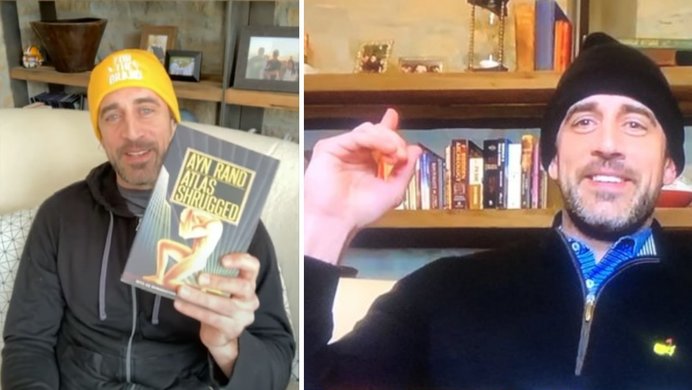
Thursday
I see that Novak Djokovic has joined the company of those elite athletes who are intent on extending the Covid pandemic. Like Green Bay quarterback Aaron Rogers, Djokovic thinks he is justified in playing fast and loose with the truth when it comes to vaccinations. While Rogers misled people into thinking he’d been vaccinated, Djokovic assured Australian authorities he hadn’t been traveling, when in fact he’d been flying around the world—as well meeting sans mask with various reporters and fans, even though he knew he had Covid.
From a literary point of view, Rogers interests me more since he recently revealed his favorite novel. In light of his behavior, I should have been able to guess that he is a fan of Ayn Rand’s Atlas Shrugged.
I’ve written multiple times about Rand (for instance, here and here) so I won’t go into detail. The novel’s hero John Galt thinks that rules are for wusses and that real men pull themselves up by their own bootstraps. At one point he declares, “I swear—by my life and my life of it—that I will never live for the sake of another man, nor ask another man to live for mine.” The successful entrepreneur is a combination of victim complex (“They don’t appreciate me”) and revenge fantasy (“The world’s going to fall apart when I’m gone and then they’ll be sorry”). Blogger John Rogers has delivered one of the great indictments of Atlas Shrugged, noting how it appeals to stunted fantasies:
There are two novels that can change a bookish fourteen-year old’s life: The Lord of the Rings and Atlas Shrugged. One is a childish fantasy that often engenders a lifelong obsession with its unbelievable heroes, leading to an emotionally stunted, socially crippled adulthood, unable to deal with the real world. The other, of course, involves orcs.
I can somewhat understand how premier athletes like Rogers and Djokovic are aided by megalomanic, Galt-like illusions of their superiority over others. That supreme confidence—which comes to their aid when even the least little smidgen of self-doubt could result in defeat—also leads them to shrug off their responsibilities to lesser mortals. It took such confidence for Djokovic to overcome two match points, with Roger Federer serving, to win Wimbledon in 2019. If the world falls apart when Rogers and Djokovic shrug, well too bad for the world.
I contrast them with Lebron James, who—as much of a health nut as Djokovic—was also initially hesitant about taking the vaccine. James changed his mind, however, when he realized that getting the shot would protect the people that he loved. Because thoughts about others balanced out his focus on himself, he became a model to be followed rather than a pariah.
John Galt doesn’t acknowledge the many ways that society contributes to the success of people like him. Nor, according to reports, did Ayn Rand. According to Gene Bell-Villada’s excellent book on her, Rand received all kinds of aid from others, even though she proudly proclaimed, “No one helped me, nor did I think at any time that it was anyone’s duty to help me.” Bell-Villada details this aid, including (I quote from one of my earlier posts),
her mother’s jewels that financed her trip to the United States; the free room and board, money and reference letter she received from her American relatives; the subsidized housing she got at the Hollywood Studio Club; to… The list goes on and on, all the way to the cancer surgery that would have bankrupted her had it not been for Medicare.
I’m willing to grant that Rand’s novel contributes to Rogers’ preternatural calm when 250-pound linebackers are bearing down upon him. But I also think of those whom he influenced who have ended up in ICU wards and on ventilators.
Does he just shrug?